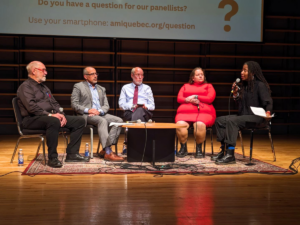MAiD and Mental Illness: A Complex Issue
On November 2nd, AMI hosted a panel discussion to address the complex and nuanced subject of Medical Assistance in Dying (MAiD) for mental illness. MAiD legislation was first introduced in June 2016 for eligible Canadian adults whose death is imminent who request medical assistance in dying. In 2021 the law expanded to those not at imminent risk of dying, but whose illness, disability, or disease is causing enduring suffering that is intolerable to them. In December 2022 the Government of Canada announced its intention to introduce legislation to seek an extension of the temporary exclusion of eligibility for persons suffering solely from mental illness, and in February 2023, Bill C-39 was introduced, to further extend that temporary exclusion for a period of one year, until March 17, 2024.
We welcomed psychiatrists Dr. Sonu Gaind and Dr. Derryck Smith, and Al Raimundo and Chris Summerville, both with lived experience of mental illness, to share their perspectives. The discussion was moderated by Nantali Indongo, CBC host and producer of The Bridge. As expected, it was difficult to agree on a subject as controversial and nuanced as MAiD for mental illness, and our hope was to shed light on this issue, rather than to take one position or another.
Some of the issues that were brought up during the discussion included:
- How is MAiD for mental illness different from MAiD in the context of physical conditions?
- Can MAiD for people with mental illness be interpreted as focusing on death rather than on life?
- Given that the trajectory of mental illness is often unknown and unpredictable, is it possible at all to view some mental illnesses as irremediable?
- Is it reasonable to suggest that people diagnosed with mental illness do not actually want to die, but instead they don’t want to live the way they do? Is it, therefore, living conditions that should be addressed, rather than the request for MAiD?
- Is there a risk that making MAiD an option for people living with mental illness may lead society not to improve unacceptable living conditions (like inadequate housing and treatment options) which people living with mental illness often experience?
- How does the issue of autonomy factor into the request for MAiD?
- How are people with mental illness from marginalized communities likely to fare if MAiD is legislated?
- What role may families have if MAiD for mental illness is legislated?
It is up to you to try to make up your own mind! Click here to watch the recording of the lecture on AMI’s YouTube channel.
Sign up for our emails to stay in touch
Please also follow us on:



